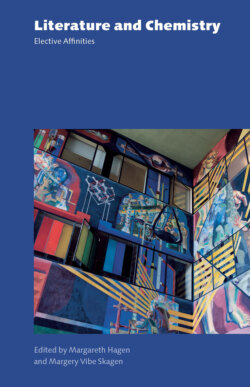Читать книгу Literature and Chemistry - Группа авторов - Страница 20
На сайте Литреса книга снята с продажи.
“THE MNEMAGOGUES”
ОглавлениеTo explore Levi’s sensory chemistry, and from there his empiricist model for thinking through the Holocaust, let’s return to 1946 for a moment.
Alongside his bloody, concise poems, his medical report, and his “calm study of the human mind”, as he described If This is a Man (If This is a Man/ The Truce, p. 15), in 1946 Levi also wrote a strange, disturbing, and apparently disconnected short story about chemistry, pharmacology, and the senses, in particular the sense of smell.
The story is called “The Mnemagogues” and it was first published in English in the 1990 collection The Sixth Day (pp. 11-18).
“The Mnemagogues” tells of an old provincial doctor, Ignazio Montesanto, who is close to retirement and has withdrawn into a secluded, unhappy world, obsessed with a strange chemical-psychological experiment with smell. Montesanto has distilled his memories into chemical compounds, each of which captures and preserves in a flask the smell of a long-past place, a feeling, a person, or something similar. His battle is against time and loss itself: “I by my nature can only think with horror,” he says, “of the eventuality that even a single one of my memories should be erased” (Sixth Day, p. 14).
But Montesanto’s flasks have become an addiction, a drug, a foggy barrier between himself and lived experience out in the world. He has come to exist only through his perfumes: “some might say that they are my very person” (Sixth Day, p. 15). The new young doctor Morandi, from whose point of view the story is told, is at first seduced by the game of identifying the different smells, by the chemical miracle of entering into Montesanto’s mind and memories through them, but he comes away strangely disturbed, needing fresh air and contact with friends – clean smells and human touch – as though to cleanse himself of some poison.
“The Mnemagogues” amounts to a filtered, fictional meditation on how best to preserve and use the memories burning within Levi in 1946, on the devastating burdens and dangers of both fading memory and excessive memory – like Borges’ famous hero Funes the Memorious. But it is also a reflection, through chemical experiment, on the substances of our knowledge of ourselves and of our world, and how they relate to matter and to our senses.
Montesanto’s “chemical sensorium” is prodigious but flawed; his memories are preserved perfectly, but somehow also introverted, desensitised to the present and to lived reality. Levi implicitly asks how we can both retain our sensations and turn them into non-solipsistic knowledge.
Morandi and Montesanto – like Levi and Debenedetti, or like Chekhov, we might say – are expert readers and writers of sensory impressions because they are variously medics, pharmacologists, and chemists. In his later work, Levi was keen to argue that the chemist in him gave him a “surplus” in language and specifically in the language of the senses, by which he meant an ability to distinguish and precisely to describe colour, smells, textures, and structures in a way usually unavailable to the traditional humanistic literary intellectual:
I find that I am richer than my fellow writers, because for me terms such as “bright”, “dark”, “heavy”, “light”, “blue” have a far wider range of meanings. For me, blue is not only the blue of the sky, I have five or six other blues to choose from … I have held in my hands materials which are not around in the everyday world, which have properties out of the ordinary, which have helped me extend the technical capacities of my language. (Levi and Regge, p. 59)
Levi’s chemistry, then, is also, among other things, a language of the senses, of colour and touch here, or of smell in “The Mnemagogues”. This is not merely a sensuous or expressionistic language of sensation, although on occasion it is that too; it is rather an analytical language in which the senses are the toolbox and conduit to forms of understanding, in which the end result is as much a heightened ethical sensitivity as some additional material perception, a sort of laboratory ethics. He outlines this lab ethics in an essay entitled “The Mark of a Chemist”:
Here [in the laboratory] other virtues were needed: humility, patience, manual dexterity; and also (why not?) good senses of sight and smell, strength of nerve and muscle, resilience in the face of failure. (Other People’s Trades, pp. 86-91)9
